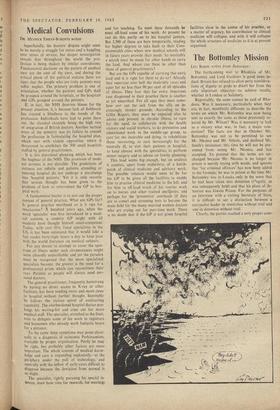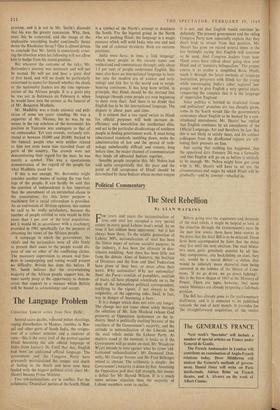The Bottomley Mission
LEO BARON writes from Bulawayo :
The forthcoming visit to Rhodesia of Mr. Bottomley and Lord Gardiner is good news in- deed. Britain has refused to allow petty considera- tions of. dignity or pride to divert her from the only important objective—to achieve results, whether in London or Salisbury.
Regrettably, the same cannot be said of Rho- desia. Was it necessary, particularly when they are, in fact, manifestly different, to describe the terms on which Mr. Bottomley was now being sent as exactly the same as those previously re- jected by Mr. Wilson? Was it necessary to'hail as a victory what was, in fact, a major con- cession? The facts are that in October Mr. Bottomley was not to be permitted to see Mr. Nkomo and Mr. Sithole, and declined Mr. Smith's invitation; this time he will not be pre- vented from seeing Mr. Nkomo, and has accepted. To pretend that the terms are un- changed because Mr. Nkomo is no longer in prison is merely toying with words, and ignores that 'for criminal offences' has now been added to the formula; he was in prison at the time Mr. Bottomley was in. Lusaka only in the sense that he had been taken into detention (i'legally, as was subsequently held) and that his place of de- tention was Gwelo Prison. For the purposes of an interview with a visiting Secretary of State, it is difficult to see a distinction between' a nationalist leader in restriction without trial and one in detention without trial.
Clearly, the parties reached a very proper Qom- promise, and it is not to Mr. Smith's discredit that his was the greater concession. Why, then, must this be concealed, and the image of the implacable unyielding leader continually thrust down the Rhodesian throat? One is almost driven to conclude that Mr. Smith is consciously creat- ing the situation when his following will not allow him to budge from his stated position.
But whatever the outcome of the talks, Mr. Bottomley's journey was necessary and will not be wasted. He will see and hear a great deal at first hand, and will no doubt be particularly concerned to assess for himself whether the chiefs or the nationalist leaders are the true represen- tatives of the African people. It is a great pity he was not in Bulawayo on February 6, when he would have seen the answer at the funeral of of Mr. Benjamin Madhcla.
Mr. Madhlela was a trade unionist and poli- tician of some ten years' standing. He was a supporter of Mr. Nkomo, but he was by no means in the top echelons of the movement; his position in Tanzania was analogous to that of an ambassador. Yet vast crowds, variously esti- mated at between 10,000 and 20,000, flocked to the funeral; people who were neither related to him nor even knew him travelled from all parts of the country. The crowds were not demonstrating their regard for the man; he was merely a symbol. This was a spontaneous demonstration of the regard of- the people for what Madhlela stood for.
If this is not enough, Mr. Bottomley might consider another means of testing the true feel- ings of the people. It can hardly be said that the question of independence is less important than the amendment of an entrenched clause in the constitution; for this latter purpose a machinery for a racial referendum is provided. As an expression of African opinion, this cannot be said to be really satisfactory, because the number of people entitled to vote would be little more than 1 per cent of the total population; but it Would be in accordance with a machinery provided in 1961 specifically for the purpose of obtaining the views of the African people.
A campaign in which the government, the chiefs and the nationalists were all able freely to present their cases to the people would dis- pose of one or other of the conflicting claims. The necessary supervision to ensure real 'free- dom in campaigning and voting would present no difficulty; Britain has done this before. If Mr. Smith believes that the overwhelming majority of the African people support him, he must surely jump at the opportunity to demon- strate that support in a manner which Britain will be bound to acknowledge and accept.



































 Previous page
Previous page